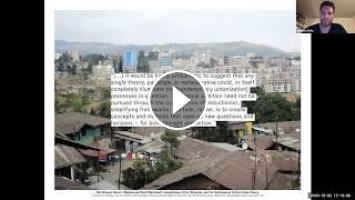October 5, 2020
Speaker: Dr. Sascha Delz. Assistant Professor, USC School of Architecture
Architectural and urban researchers with a background in design are often caught in the middle of disciplinary research dogmas and norms. Yet this can be an advantage: While designers usually have to catch up with scientific methods and standards, they are often not as much confined and biased by particular research paradigms. This openness can and should be considered a quality when attempting to explore and understand the complexities, ambiguities, and incompleteness of the three-dimensional, built environment.
Showing aspects of his research on urban transformation in Addis Ababa, Ethiopia, Delz will address the particular decisions to establish a mixed approach and framework. Mainly based on a case study methodology, the research can be understood as a collection of spatial probes that oscillate between in-depth and punctual systems analysis, as well as between qualitative and quantitative enquiries. Through this, the probes not only enable the tracing of the more abstract levels of global networks, politics and economic processes, but also allow description of the interrelated and tangible results of local spatial formation and architectural production on the ground.
Speaker: Dr. Sascha Delz. Assistant Professor, USC School of Architecture
Architectural and urban researchers with a background in design are often caught in the middle of disciplinary research dogmas and norms. Yet this can be an advantage: While designers usually have to catch up with scientific methods and standards, they are often not as much confined and biased by particular research paradigms. This openness can and should be considered a quality when attempting to explore and understand the complexities, ambiguities, and incompleteness of the three-dimensional, built environment.
Showing aspects of his research on urban transformation in Addis Ababa, Ethiopia, Delz will address the particular decisions to establish a mixed approach and framework. Mainly based on a case study methodology, the research can be understood as a collection of spatial probes that oscillate between in-depth and punctual systems analysis, as well as between qualitative and quantitative enquiries. Through this, the probes not only enable the tracing of the more abstract levels of global networks, politics and economic processes, but also allow description of the interrelated and tangible results of local spatial formation and architectural production on the ground.
- Catégories
- E commerce Formations















Commentaires